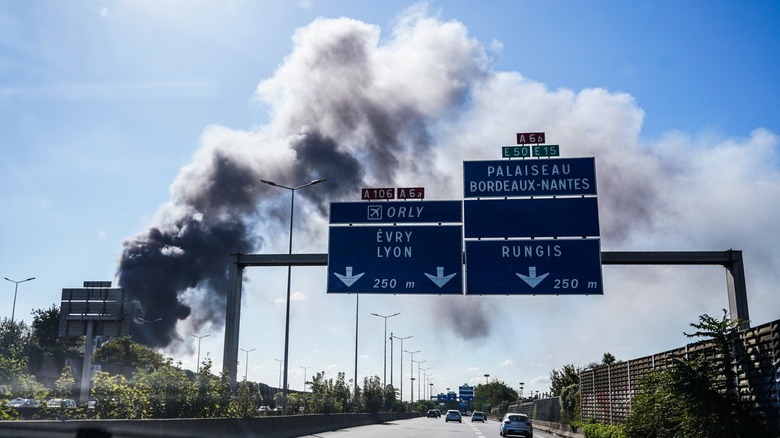A Recent Fire Has Devastated Paris' Rungis Market
On Sunday, September 25, AP News shared news that Paris' historic Rungis International Market, one of the largest wholesale markets in the world, caught fire. Originally constructed during the 5th century, per Rungis International, the market's history is deeply rooted in the city's antiquity. During the Middle Ages, King Louis VI brought the market to the city's center, where it was expanded and given the name "Les Halles" in 1181. After a fire in 1811, the market was permanently reconstructed.
The massive Les Halles market went on to become known as the "belly of Paris," as coined by Émile Zola (via Dezeen). With its many buildings offering culinary staples like bread, cheese, eggs, butter, and more, hundreds of thousands of tons of fruits and vegetables passed underneath Les Halles' glass roof and through its column-lined alley each year. However, the city's traffic quickly made it difficult to access, and it was decided that the market would be moved outside of Paris. In 1959, Rungis, a 578-acre structure in the southern suburbs, was chosen.
Rungis Market opened its doors 10 years later. The market employed over 12,000 people and supplied 35% of the meat and half of the produce and seafood to the entire city of Paris as of 2019, according to Explore Paris – that is until it erupted in flames earlier this week.
The damage
Thanks to the response of firefighters that Sunday afternoon, the fire at Rungis was successfully contained. Ultimately, 7,000 square meters of the building were destroyed; however, no injuries were caused, according to a statement given to AP News from a spokesperson for the Paris fire service. The Rungis International Market's President, Stéphane Layani, posted a statement on Twitter thanking the Paris Fire Brigade for their bravery. He continued by expressing condolences for Les Halles Mandar, the fruit and vegetable market that perished in the fire: "This warehouse's destruction is a great loss. The Rungis market will resume operations tomorrow. Even so, such a strategy befalling a vendor affects the entire market at its core" (via Fresh Plaza).
While the cause of the fire remains unknown, the impact the destruction will have on the Les Halles Manadar market operators is certain. Due to the warehouse's size and the sheer number of wholesalers within it, relocating while rebuilding the damaged area could be challenging. Nico Shaft, a longtime trader at the wholesale market, told Fresh Plaza, "I've known these people for 30 years and sympathize with them ... They saw their life's work go up in smoke all at once. It will take years to rebuild all that, there's also little room on the market to set up elsewhere."

